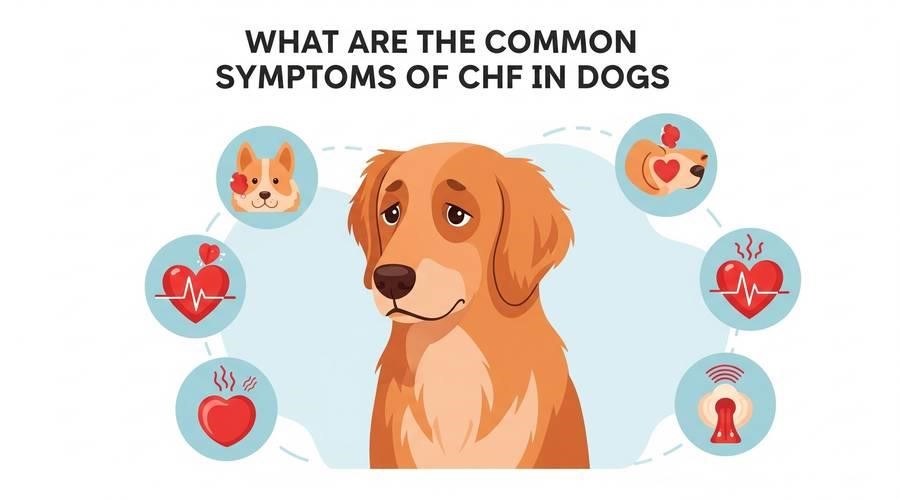Have you noticed that your dog coughs harder at night and pants even after short walks? Small things, such as the dog’s increasing breathing rate, how quickly they get tired, or even how well they sleep at night, can reveal a lot about their health. Most of these changes are innocuous, particularly as dogs age. But occasionally they are more than that. These are the first clinical signs of CHF in dogs: Congestive Heart Failure.
For pet owners, the identification of the early signs of congestive heart failure seems to be daunting. For veterinary staff, it’s a sign of how subtly the body communicates with regard to sending messages. The truth is, recognizing the early signs of CHF can often mean the difference between a manageable condition and a life-threatening crisis.
Table of Contents
What Is CHF in Dogs?
Congestive heart failure happens when your dog’s heart can’t pump blood the way it needs to anymore. Instead of flowing freely, the blood begins to back up, leading to fluid accumulation in the lungs, chest, or abdomen. That’s why you may notice ascites in dogs (a belly distension) or coughing spasms that just won’t stop.
But CHF isn’t one disease; it’s typically the outcome of some other cardiac disease, for example, dilated cardiomyopathy or mitral valve disease in dogs. The heart slowly deteriorates and cannot keep up with the body’s needs.
Now that you have an idea of what congestive heart failure in dogs actually is, the next step is to study the early warning symptoms of the disease.
Early Warning Signs
The first symptoms of congestive heart failure in dogs are subtle and can be simply ignored. A cough that appears only at night, labored breathing at rest, and lethargyness are all warning signs of CHF in dogs. Some dogs become restless at night, moving around since lying flat makes the breathing difficulties worse.
While none of these signs is necessarily alarming, a combination of these symptoms can collectively point to a serious underlying health condition. Veterinarians emphasize the need to act early, as once the disease advances, the signs become much more apparent and much more difficult to manage.
As CHF advances, those subtle signals rapidly progress to obvious symptoms no pet parent can afford to overlook.
Advanced Symptoms
As the condition advances, the dog’s heart failure symptoms become undeniable. Owners may notice their dog coughing more frequently, especially when resting. Breathing becomes strained, at times with wheezing noises. A previously lively dog might now decline walks, avoid stairs, or faint unexpectedly due to the heart failing to provide sufficient blood to the brain.
One of the most disturbing signs is ascites, which is an accumulation of fluid in the abdomen, producing a distended look. Appetite usually decreases, and in advanced cases, dogs cough up foamy or pink-colored fluid, a sign of fluid accumulation in the lungs.
The following are the most typical symptoms of congestive heart failure in dogs during this phase:
- A chronic cough that becomes worse at night
- Panting and labored breathing even at rest
- Distended abdomen due to fluid accumulation (ascites)
- Sudden collapse or fainting
- A decrease in appetite or refusal to eat
- Coughing up a bloody liquid
All these symptoms point to a common thing: the heart is failing, and the body can no longer keep it a secret. If these symptoms are addressed quickly at an initial stage, the quality of life for a dog can be radically improved.
But symptoms aren’t just indicative of a medical condition; they also define a dog’s comfort.
Why Recognizing Symptoms Early Matters
Dogs are inherently tough animals. They hardly complain even when their bodies are under tremendous pressure. This explains why signs of CHF go undetected until they advance to later stages.
Pet parents play the most important role here. They are the ones who see day-to-day changes in the health of the pet. Their keen observations regarding the habits of pets give veterinarians the information they need to diagnose this deadly condition. Once symptoms are reported, veterinarians can step in with tests and imaging to confirm the diagnosis, making the client-vet partnership the foundation of early intervention.
For veterinarians, timely reporting by clients translates to sooner diagnostics such as chest X-rays, blood work, and echocardiograms. These tests verify fluid presence, determine heart size, and identify how far along the disease is.
Moving forward, we will discuss how the symptoms of congestive heart failure affect a dog’s life in terms of health and comfort.
How CHF Symptoms Affect a Dog’s Quality Of Life
The heart failure symptoms in dogs not only cause medical distress to the dogs, but they also have an emotional side to them. It’s significant to recognize what they look like in daily life. To pet owners, these symptoms are not only clinical but also emotional.
A dog who previously ran up the stairs but now stops halfway isn’t merely exhibiting exhaustion; they’re demonstrating how CHF is redefining what feels comfortable in their daily life. Coughing at night breaks up sleep. Shortness of breath cuts playtime short, and loss of appetite makes them less interested.
Each symptom is more than a compromised heart; it’s a reflection of decreasing happiness and comfort in your dog’s life. And behind many of these symptoms lies one of the most common heart diseases in dogs: mitral valve disease.
The Connection Between CHF and Mitral Valve Disease
Among the conditions leading to CHF, mitral valve disease is particularly noteworthy. If the valve between the left atrium and ventricle fails to close well, blood flows backward, placing additional strain on the heart. Eventually, this backflow produces congestive heart failure.
Smaller dogs such as Cavalier King Charles Spaniels, Dachshunds, and Poodles are especially vulnerable. For these, even subtle symptoms of heart issues in dogs, such as coughing or exhaustion, must never be overlooked.
For further insight into how this condition arises and evolves, you can follow this comprehensive guide: Mitral Valve Disease in Dogs.
Awareness of the relationship between mitral valve disease and CHF keeps pet parents and veterinarians ahead of the disease.
How To Manage CHF Symptoms?
Once CHF is diagnosed, cure is no longer the goal, but care. The symptoms of congestive heart failure may not disappear, but with effective management, they can be minimized so that your dog leads a more comfortable life.
Some of the most popular management approaches are:
- Veterinary-prescribed medications – medications which facilitate the removal of excess fluid, assist heart function, and facilitate breathing.
- Low-sodium dietary changes – decreasing salt will help avoid fluid buildup and allow the heart to function more easily.
- Regulated exercise regimens – short walks might assist, but hard work must be avoided.
- Home monitoring of breathing – measurement of breaths per minute, particularly resting, assists in monitoring changes in condition.
- Routine vet visits – routine X-rays, lab work, and check-ups are essential to tailoring treatment as CHF advances.
- Weight control – maintaining your dog at a healthy weight reduces the burden on the heart.
All of these steps not only manage the disease; they also make your dog more comfortable and secure in daily life. With proper care, many dogs with CHF have meaningful, happy lives, even while living with the condition.
Now, let’s wrap things up with the final thoughts.
Final Thoughts
CHF in canines is a disease that hides itself behind mild and subtle signs before it reaches its worst point. From the initial feeble cough to severe fluid accumulation, each symptom tells a tale.
For pet owners, the task is not writing off these changes as “just old age.” For vets, every nuance that a client reports could be the key to early diagnosis.
The symptoms of congestive heart failure are the body’s way of speaking up. The earlier you hear, the earlier you can do something about it. And when it comes to the heart, every day counts.
FAQs
What are the common heart disease symptoms in dogs?
Typical symptoms of dog heart disease involve chronic coughing, struggling to breathe, loss of stamina, dizziness episodes, and ascites or accumulation of fluid within the abdomen. Weight loss, nighttime restlessness, or resistance to physical activity are also signs that you might observe
Can congestive heart failure (CHF) in dogs be cured?
Sadly, congestive heart failure cannot be completely cured. But it may be controlled with medication, diet, and frequent veterinarian monitoring. Treatment aims to decrease fluid accumulation, increase heart function, and prolong both length and quality of life.
What is the expected lifespan of dogs with CHF?
The life expectancy of dogs with CHF depends on the disease stage and management. It’s an average of 6 months to 2 years of survival after being diagnosed. Many pets live happy, comfortable lives with proper management and treatment, and adjustments in lifestyle.










